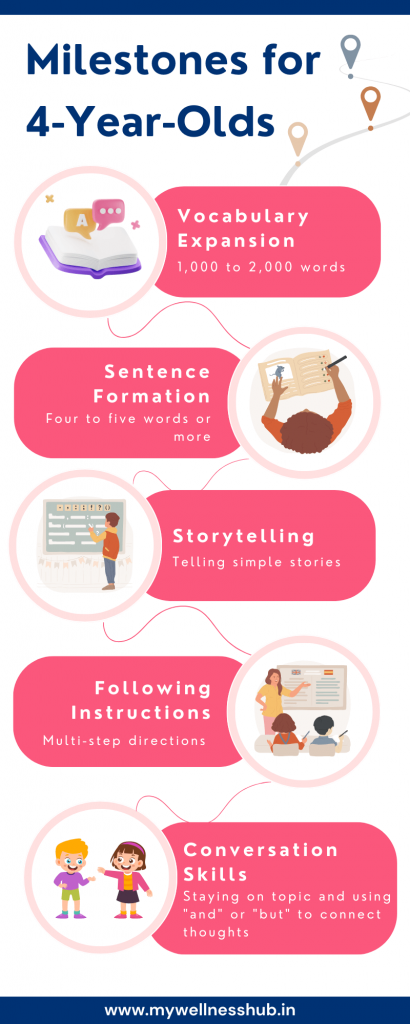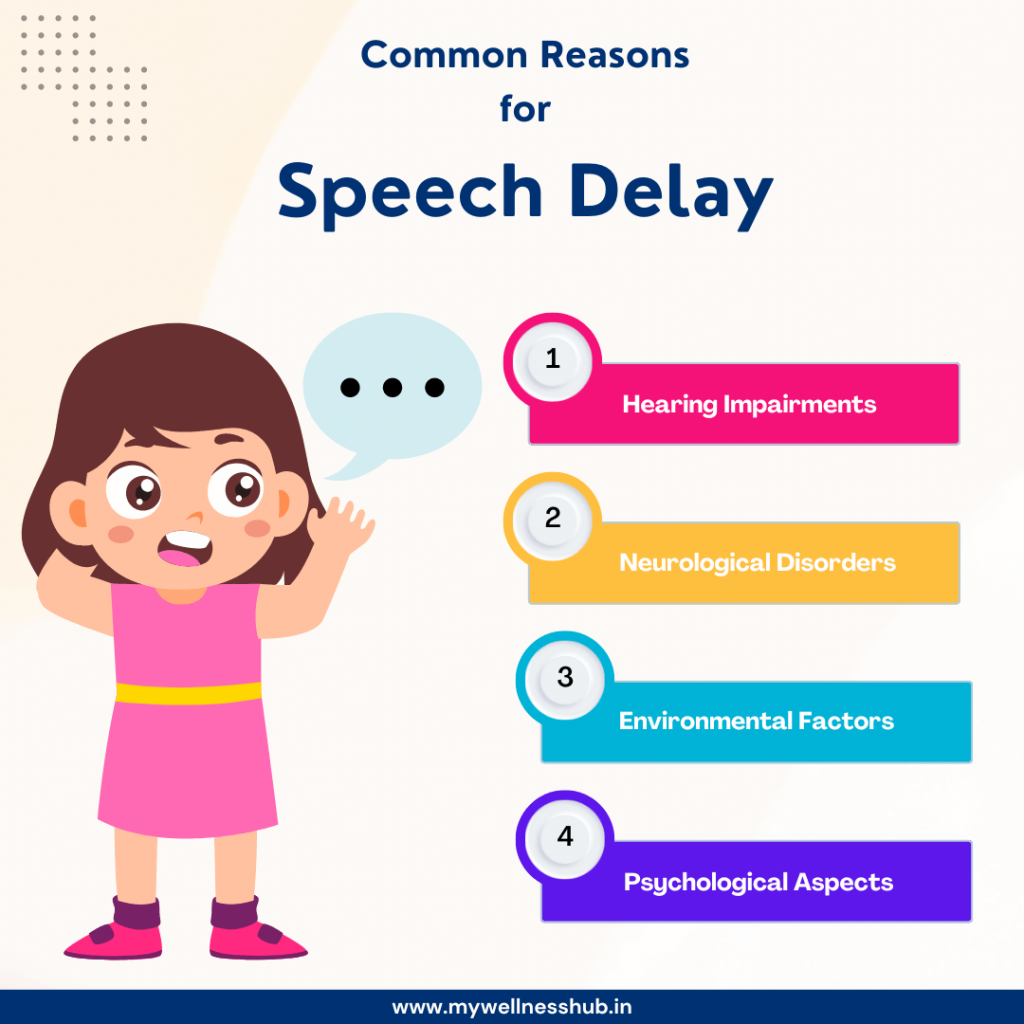Why My 4-Year-Old Isn’t Talking: What to Know
By Rajini D
Last Updated: May 8, 2024
As a parent, it can be concerning to notice that your 4-year-old isn’t talking as much as you expect. You might be wondering, “Why is my child not talking?” or “Is this normal for their age?” Rest assured, you’re not alone on this journey. Many parents share the same worries about their children’s speech development.

Understanding Speech and Language Milestones in 4-Year-Olds
By the age of 4, children typically reach several key milestones in their speech and language development. Understanding these milestones can help you gauge whether your child is developing at their own pace or may need additional support.
Vocabulary Expansion
At this stage, children often have a spoken vocabulary of around 1,000 to 2,000 words. They should be able to use these words to form complete sentences, often of four to five words or more. For example, they might say, “I want to play outside,” or “Can I have a snack?“
Sentence Formation
Four-year-olds are generally able to string together words into sentences. Their sentences should start to include more complex structures, such as “and” or “but,” to connect thoughts. They should also be able to tell simple stories and describe events from their day.
Understanding Instructions
Another key milestone is following instructions. A 4-year-old should be able to follow multi-step directions, such as “Put on your shoes and grab your backpack.” They should also be able to understand sequencing terms like “first” and “next.”
Also read: Is My 3-4 Year Old Talking Enough? A Parent’s Guide to Milestones
Common Reasons for Delayed Talking
If your child isn’t talking as expected, it’s helpful to understand some common reasons for speech delay in 4-year-olds.

1. Hearing Impairments
Hearing issues can impact a child’s ability to hear and replicate sounds, leading to speech delays. If your child isn’t responding to their name or has trouble following directions, a hearing assessment might be beneficial.
2. Neurological Disorders
Conditions such as autism, cerebral palsy, or muscular dystrophy can affect speech and language development. These disorders may impact a child’s ability to coordinate the muscles needed for speaking or processing language.
3. Environmental Factors
A child’s environment plays a crucial role in language development. Limited exposure to spoken language, minimal interactive play, or excessive screen time can hinder a child’s ability to develop speech and language skills.
4. Psychological Aspects
Sometimes, a child’s personality can contribute to speech delay. Shyness or anxiety might make a child less likely to speak, especially in unfamiliar or stressful situations.
Common Reasons for Delayed Talking in 4-Year-Olds
| Reason | Description |
|---|---|
| Hearing Impairments | – Hearing issues can hinder a child’s ability to hear and replicate sounds \n- Can affect language comprehension |
| Neurological Disorders | – Conditions like autism or cerebral palsy affect speech and language \n- May impact coordination and processing |
| Environmental Factors | – Limited exposure to language hinders development \n- Excessive screen time reduces verbal interaction |
| Psychological Aspects | – Shyness or anxiety may lead to reluctance to speak \n- Familiar and supportive environments encourage talking |
Know more: Is Your 3-Year-Old Talking Late?- Help for Speech Delay
When to Seek Professional Help
Recognizing when to seek professional help is crucial for supporting your child’s speech development. Here are some signs that suggest it might be time to consult a speech-language pathologist (SLP):
- Lack of Progress: If there seems to be no progress in speech or language skills over several months.
- Frustration During Communication: If your child shows signs of frustration or distress while attempting to communicate.
- Limited Understanding of Language: If your child has difficulty understanding simple instructions or fails to respond to their name.
- Reduced Social Interaction: If they avoid interacting with peers or have difficulty participating in age-appropriate social activities.
Know more: How to Know If Your Kid Needs Speech Therapy?
Preparing for Your Visit to a Speech Therapist
Taking your child to a speech therapist for the first time can feel daunting. Here’s how you can prepare to make the experience smooth and productive for both you and your child.
Checklist for Your Visit:
- Gather Information: Make a list of concerns or behaviors you’ve noticed in your child’s communication. This could include difficulty pronouncing words, limited vocabulary, or frustration during communication.
- Prepare Questions: Write down any questions you have for the speech therapist. This might include questions about the assessment process, potential diagnoses, or therapy options.
- Bring Records: If your child has undergone any previous assessments or has any relevant medical history, bring those records to the appointment.
- Plan for Comfort: Bring along your child’s favorite toy or comfort item to help them feel at ease during the assessment.
- Keep an Open Mind: Be prepared to discuss various possibilities and next steps with the therapist.
Explore more on How Long Will My Child Need Speech Therapy?
Record Your Child’s Communication Behaviors
Keeping a record of your child’s communication behaviors can help the speech therapist understand their challenges and tailor the assessment accordingly. Here’s what you can track:
- Words and Sentences: Note what words your child uses and how often they speak in sentences.
- Understanding: Observe how well your child follows instructions or responds to questions.
- Social Interaction: Pay attention to how your child interacts with peers or family members.
- Emotional Responses: Watch for signs of frustration or withdrawal during communication attempts.
At-Home Strategies to Encourage Speech
Encouraging speech and language development at home can make a big difference for your child. Here are some practical tips to try:
1. Engage in Daily Reading Sessions
Reading to your child daily helps expose them to new words and language patterns. Choose books with colorful pictures and engaging stories, and encourage your child to describe what they see or predict what might happen next.
2. Incorporate Play That Promotes Verbal Exchanges
Playtime is an excellent opportunity to encourage communication. Use toys and games that involve turn-taking and conversation. For example, you can play with dolls or action figures and create simple dialogues or use building blocks to describe what you’re creating together.
3. Use Everyday Routines as Opportunities for Conversation
Daily routines provide countless opportunities for conversation. During meals, bath time, or while getting dressed, talk to your child about what you’re doing and ask questions to encourage them to respond.
By integrating these activities into your daily life, you can create a supportive environment that encourages your child’s speech and language development.
At-Home Strategies to Encourage Speech
| Activity | Benefits |
|---|---|
| Daily Reading Sessions | – Exposes children to new words and language patterns \n- Develops listening and comprehension skills |
| Play That Promotes Verbal Exchanges | – Encourages turn-taking and conversation \n- Enhances social interaction skills |
| Use Everyday Routines for Conversation | – Builds vocabulary and communication skills \n- Creates opportunities for meaningful language use |
Also read: 12 Activities to Boost Kids Speech & Language
Understanding and Patience – Key to Progress
As you work with your child to improve their speech, it’s important to practice patience and understanding. Every child develops at their own pace, and progress can vary significantly.
Be Patient with Progress
Your child’s speech improvement might be gradual, and that’s okay. Celebrate small milestones and remain supportive as they develop their communication skills. Encouragement and positivity can go a long way in helping your child feel confident in their abilities.
Provide Understanding Support
Your understanding is crucial to your child’s success. If they struggle with certain words or sounds, offer gentle guidance and support. Reassure them that it’s okay to make mistakes and encourage them to keep trying. Your positive reinforcement can make all the difference in their progress.
Conclusion
Recognizing when a child might need help with their speech is crucial for their development. By understanding the milestones, exploring common reasons for delay, seeking professional help when needed, and engaging in at-home strategies, parents can support their children effectively. It’s important to remember that every child’s development path is unique, and with understanding and patience, you can help your child thrive. For more guidance on supporting your child’s speech and language development, visit Wellness Hub, where we offer resources to assist you on this journey.
Frequently Asked Questions:
1. Why is my 4-year-old not talking yet?
There are various reasons why a 4-year-old might not be talking yet, including hearing impairments, neurological disorders, environmental factors, or psychological aspects. It’s essential to identify the underlying cause to address the issue effectively.
2. When should I be concerned about my 4-year-old not talking?
If your child shows no progress in speech or language skills over several months, gets frustrated while trying to communicate, has difficulty understanding instructions, or avoids social interactions, it might be time to consult a speech-language pathologist.
3. How can I help my 4-year-old to talk?
You can encourage your child’s speech by engaging in daily reading sessions, incorporating play that promotes verbal exchanges, and using everyday routines as opportunities for conversation. Additionally, seeking professional help can provide targeted support.
4. What are typical speech milestones for a 4-year-old?
By age 4, children typically have a vocabulary of around 1,000 to 2,000 words, can form sentences, understand multi-step instructions, and tell simple stories. Each child develops at their own pace, so some variations are normal.
5. How can I prepare for a speech therapy appointment?
To prepare for a speech therapy appointment, gather information about your child’s communication behaviors, prepare questions for the therapist, bring relevant medical records, plan for comfort, and keep an open mind. Recording your child’s communication behaviors can also be helpful.
6. Can a child with a speech delay catch up on their own?
While some children with a speech delay might catch up on their own, early intervention through speech therapy can significantly improve their progress. It’s essential to seek professional advice if you have concerns about your child’s speech development.
7. What are common reasons for delayed talking in 4-year-olds?
Common reasons for delayed talking in 4-year-olds include hearing impairments, neurological disorders, environmental factors, and psychological aspects. Identifying the cause can help determine the best approach for addressing the delay.
8. How can I support my child’s speech development at home?
You can support your child’s speech development at home by reading together daily, engaging in play that encourages verbal exchanges, and using everyday routines to start conversations. These activities create a supportive environment for communication growth.
9. How do I know if my child has a speech delay or is just a late talker?
If your child isn’t meeting typical speech and language milestones or shows signs of frustration during communication, they might have a speech delay. Consulting a speech-language pathologist can help determine if your child is just a late talker or if they need further support.
10. What are the benefits of early intervention for speech delays?
Early intervention for speech delays can lead to faster progress, improve communication skills, and reduce the severity of the delay over time. It also provides parents with strategies to support their child’s development effectively.
About the Author:
Rajini Darugupally
M.Sc., Speech-Language Pathologist (9+ years of experience)
Rajini is a passionate and dedicated Speech-Language Pathologist with over 9+ years of experience, specializing in both developmental speech and language disorders in children and rehabilitation in adults. Driven by a desire to empower each individual to find their voice, Rajini brings a wealth of experience and a warm, genuine approach to therapy.
Currently, at Wellness Hub, she thrives in a team environment that values innovation, compassion, and achieving results for their clients.
Connect with Rajini to learn more about how she can help you or your loved one find their voice.
Book your Free Consultation Today
Parent/Caregiver Info:
Client’s Details:
* Error Message








